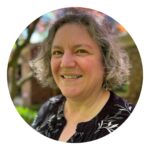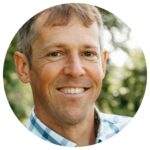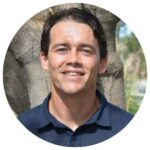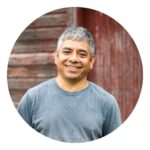This is a snapshot agenda that will include expert speakers, panel discussions, working sessions and site visits. All items are subject to change.
MONDAY, JUNE 24
4:00 – 5:30 PM | Tour + Tasting of Indigenous Food Lab
This is a closed event to pre-registered attendees. If you registered, you will receive additional details via email. Pre-registered attendees will start the convening with a Tour & Tasting at Indigenous Food Lab! The NATIFS culinary team will lead a demonstration, followed by a presentation by Chef Sean, a tour of the Indigenous Food Lab featuring an assortment of Indigenous food samples, and an opportunity to browse the Indigenous Food Lab Market.
North American Traditional Indigenous Food Systems (NATIS) is a nonprofit organization founded by Chef Sean Sherman, dedicated to addressing the economic and health crises affecting Native communities by re-establishing Native foodways. NATIS has opened The Indigenous Food Lab (IFL), a professional Indigenous kitchen, demonstration studio, and Indigenous Food Lab Market retail space representing over 50 Indigenous producers and authors.
TUESDAY, JUNE 25 – Convening Day 1
8:00 – 9:00 AM | Registration and Breakfast
Attendees arrive at the Mill City Museum
9:00 – 9:15 AM | Welcome & Introduction
View Speaker

Clare Fox, SAFSF Executive Director
Clare Fox joined Sustainable Agriculture and Food System Funders as Executive Director in January 2024. Clare has dedicated her life to generating powerful partnerships for an equitable and regenerative food system. She began her work journey in independent media and grassroots organizing, advocating and reporting on a broad range of issues including immigrant rights, youth development, tenant rights and community land ownership. Clare became involved in anti-racism organizing starting in 2001 and focused her efforts on training and mobilization of white communities in racial justice movements. She then found her passion for food as a human right after recovering from diet-related health challenges. As a graduate student, she researched food policy councils as an innovation in participatory democracy for the Mayor’s Food Policy Taskforce.
In 2012, Clare joined the staff of the newly formed Los Angeles Food Policy Council, eventually serving as Executive Director for five years. At LAFPC, Clare built a collective impact network of over 400 organizations spanning the public, private, nonprofit and philanthropic sectors. By cultivating collaboration, building the capacity of member organizations and aligning interests toward a collective agenda, Clare led LAFPC’s network to tangible outcomes, political buy-in and mass community participation in policy victories such as universal SNAP at farmer’s markets, legalizing street food vending, expanding urban agriculture and the Good Food Purchasing Policy.
For four years, Clare served as Vice President of Strategic Partnerships at Everytable, a growth stage public benefit corporation with a mission to make nutritious food equitable, accessible and affordable. There, she led strategic growth and business development with nonprofits, government, schools and healthcare to grow Everytable’s food security and medically tailored meal programs into a $10m+ sustainable vertical. She also spearheaded philanthropic partnerships that led to the creation of a $12m blended capital vehicle to launch a groundbreaking Social Equity Franchise program (SEF), which provides business ownership to entrepreneurs of color through training, mentorship and access to capital. Through a stakeholder-driven process with Board and staff, she established Everytable’s first social and environmental impact metrics and produced its first Annual Impact Report. She has served on numerous boards, commissions and grant review panels.
Clare holds a degree in Critical Social Thought from Mount Holyoke College, and a Masters of Arts in Urban Planning (focus on community economic development, food systems and critical race studies) from the University of California, Los Angeles. She is the third generation of her family born and raised on unceded Tongva/Kizh land, Los Angeles, California, where she lives with her husband. She loves roaming the local hills, connecting with urban wildlife, staying up on her Spanish, gathering in community and being involved in local democracy.
9:20 – 9:50 AM | Grounding Perspective on Climate, Agriculture, and Healthy Rural Communities
A conversation with SAFSF Vice President of Impact Caesaré Assad and Wendy Johnson, owner and operator of Jóia Food & Fiber Farm.
View Speakers

Casearé Assad, SAFSF Vice President of Impact
Caesaré Assad, using all pronouns, brings over two decades of experience at the forefront of food and social change across the sectors of industry and entrepreneurship, local and national non-profits, and philanthropy. They’ve most recently supported nonprofits and foundations in developing strategic grantmaking programs, food system assessments, and cross-sector partnerships through their consultancy, Centipede Collective. Previously, Caesaré served as the Executive Director of Food System 6, empowering frontline leaders and entrepreneurs in building a more equitable food economy. Their advocacy efforts resulted in over $30 million in integrated capital support during their tenure, amplifying the impact of over 60 visionary founders.
Caesaré is a 2022 Just Economy Institute Fellow and a 2021 Emerging Leader in Food & Agriculture. Additionally, they are a strategic co-creator with Narratives Unbound, a wealth redistribution platform prioritizing Black, Indigenous, and People of Color communities. Prior to FS6, Caesaré led the merger between two national non-profits focused on health, labor, and sustainability, co-founded a food environment design consultancy, launched two wellness ventures for Whole Foods Market, and worked in marginalized communities to develop job skill training, nutrition, and holistic health programs.
As a seasoned facilitator and executive leader, Caesaré enjoys guiding organizations and teams through complex socio-economic landscapes to achieve values alignment and maximize impact. They have served on the Board of Directors for Capay Valley Farm Shop, Mandela Marketplace, Oklahoma City Food Hub, and continue to dedicate their time to volunteering with community-based organizations.
In addition to their professional endeavors, Caesaré is also an artist and actively involved in various creative healing and restorative communities. As a proud queer, non-binary, multi-racial individual from a rural Native American community, Caesaré brings a unique perspective and lived experience to their work. Drawing from years of experiences as a laborer and cook, they are acutely aware of the systemic oppression, extractive practices, and racial injustices inherent in our current economy. These understandings fuel Caesaré’s unwavering commitment to stewarding Mother Earth, nourishing communities, and fostering pathways to collective liberation.

Wendy Johnson, owner and operator, Jóia Food & Fiber Farm
Wendy Johnson is owner and operator of Jóia Food & Fiber Farm, a diverse perennial-based farm in northern Iowa growing perennial grains, grazing grassfed sheep and cows and humanely raising poultry and pigs. She started Counting Sheep Sleeping Company to add value to the fiber her 100 percent grass-fed sheep produce. Wendy also co-manages her family’s conventional corn and soybean farm. She often speaks and writes about the need for diverse enterprises and people on the land, the intersections of climate change and agriculture, food system inequality, ag policy, and the observations on the lands she cares for. Wendy is currently Climate Land Leaders co-policy lead and spokesperson and provides leadership on several boards and committees furthering the growth of a more diverse and resilient Iowa and Midwest.
10:00 – 11:15 AM | Breaking Down the Science: Agriculture and Climate
A look at the state of the science when it comes to climate and agriculture, including the opportunities for the Midwest and beyond in both adaptation and mitigation. Speakers will explore key topics such as climate impacts of industrial systems and practices, grazing, perennial systems, bioenergy, and the imperative for climate funders to engage.
View Speakers

Dr. Urvashi Rangan, Chief Science Advisor, GRACE Communications Foundation (Moderator)
Urvashi Rangan, PhD, is the Chief Science Advisor for the GRACE Communications Foundation. An environmental health scientist and toxicologist, Rangan specializes in conducting scientific investigation, policy analysis, and risk/benefit communication around food safety and sustainability. She also has expertise in food safety issues, food labeling, risk assessment, and sustainable production practices.
She is the former director of consumer safety and sustainability for Consumers Union, the policy and action arm of Consumer Reports. In that role, she oversaw all of Consumer Reports’ safety testing projects, and risk assessments, and served as the lead spokesperson on these issues, translating complex scientific concepts into actional consumer advice and policy recommendations.

Dr. Carl Bernacchi, Professor of Plant Biology and Crop Sciences, University of Illinois School of Integrative Biology, Research Plant Physiologist, USDA Agricultural Marketing Service
Carl Bernacchi is professor of crop sciences at the University of Illinois. Carl runs a research group at Illinois that attempts to understand the impacts of climatic change on Midwest crop species, and climate and land-use changes on biogeochemical cycles. His research studies the feedback between vegetation and climate in a changing environment using in-field experiments and modeling from leaf- to ecosystem scales. This work addresses many issues related to global change, including rising carbon dioxide, rising tropospheric ozone, increasing temperatures, drought, and land-use change. Carl earned his master’s degree at Bradley University and went on to earn his doctorate at the University of Illinois.

Jonathan Coppess, Associate Professor of Agriculture Policy and Law, Director of the Gardner Agriculture Policy Program, University of Illinois
Jonathan Coppess is the Leonard and Lila Gardner-Illinois Farm Bureau Family of Companies Endowed Associate Professor of Agricultural Policy in the Department of Agricultural & Consumer Economics at the University of Illinois at Urbana-Champaign. The author of The Fault Lines of Farm Policy: A Legislative and Political History of the Farm Bill, he is a member of the farmdoc project and a frequent contributor to farmdoc daily. He leads the Gardner Agricultural Policy Program and the Policy Design Lab. Jonathan previously served as Chief Counsel for the Senate Committee on Agriculture, Nutrition and Forestry, as well as on a temporary, part-time basis as a special counsel. Prior to his service on the Senate Agriculture, Nutrition, and Forestry Committee, Jonathan served as the Administrator of the Farm Service Agency at USDA and Legislative Assistant to Senator Ben Nelson. Prior to his time in Washington, DC, Jonathan was a litigation associate at Freeborn & Peters LLP in Chicago, IL. Jonathan grew up on his family’s farm in Western Ohio, earned his Bachelors’ from Miami University in Oxford, Ohio and his Juris Doctor from The George Washington University Law School in Washington, DC.

Dr. Emily Heaton, Director of Midwest Regenerative Agriculture Initiative, University of Illinois
Dr. Heaton is a Regenerative Agriculture professor in the Crop Sciences department at the University of Illinois. Her research investigates the growth and productivity of perennial grasses to guide their management of biomass, ecosystem services, and profit. As Feedstock Production Theme Leader for the Center of Advanced Bioenergy and Byproducts CABBI) Dr. Heaton advances the generation of fundamental plant science for climate-smart production in CABBI. These resilient grass crops produce oils in their stems to replace fossil oils. Dr. Heaton leads Illinois Regenerative Agriculture Initiative and connects researchers and stakeholders to advance knowledge and practices that foster health and wealth, particularly in disinvested midwest communities.

Dr. Linda Propkopy, Professor of Natural Resources Social Science, Purdue University
Dr. Linda Prokopy is Professor and Department Head in the Department of Horticulture and Landscape Architecture at Purdue University. Dr. Prokopy is an interdisciplinary social scientist who is recognized nationally and internationally for her work incorporating social science into the fields of agricultural conservation, agricultural adaptation to climate change, and watershed management. Dr. Prokopy has published over 140 peer-reviewed articles in consistently high-tier journals, she has delivered over 100 invited presentations to diverse audiences about pathways to increase adoption of conservation practices, she has generated over $33 million in competitive research funds, and she has graduated and mentored numerous graduate students and postdocs. She is currently the Project Director for a $10 million Sustainable Agriculture Systems grant from USDA-NIFA, entitled Diverse Corn Belt, that is focused on diversifying the agricultural landscape of the Midwestern US.
11:15 – 11:30 AM | Prepare for Transportation to Site Visit
11:30 – 12:15 PM | Travel to Salvatierra Farms
Buses will depart directly from Mill City
12:30 – 4:00 PM | Regenerative Agriculture Alliance and Tree-Range® Farms at Salvatierra Farms
Salvatierra Farms is a 75-acre farm in Bridgewater Township, just west of the city of Northfield, Minnesota. The farm is home to farmers and founders Reginaldo Haslett-Marroquin and Amy Haslett-Marroquin, and serves as a place to explore community, teach, learn and push the progress of regenerative agriculture forward. Salvatierra is Regi’s mother’s maiden name and is Spanish for “save the earth.” Regi and Amy honor this heritage by working as part of Tree Range Farms, a collective of regenerative farms under deployment throughout Minnesota and beyond.
Salvatierra Farms practices regenerative farming with an indigenous understanding of the concept — not a set of practices or things, but rather a way of being, thinking, and living. 28 of the 75 acres are wooded with over 60-year-old trees. An additional 8,200 hazelnut trees have been planted as the team works towards the goal of reforesting the open land and integrating native species into the poultry production model.
Attendees will enjoy a special meal produced and curated in partnership with Just Food Co-op and Tree Range Farms, witness and explore a poultry-centered regenerative agroforestry system in practice, and hear from experts at the Regenerative Agricultural Alliance and Tree Range Farms about the ecosystem change and value chain coordination needed to bring forth a sustainable, equitable, and just food system. Vegan and vegetarian lunch options will be available.
View Speakers

David LeZaks, Managing Director, Food System 6 (Moderator)
David LeZaks, Ph.D. is the Managing Director of Food System 6. He is an environmental scientist and financial activist whose work is centered around developing innovative mechanisms for financing the transition to regenerative farming and food systems. David completed his Ph.D. in Environment and Resources and an M.S. in Land Resources at the University of Wisconsin – Madison. He is based in Madison, Wisconsin, where he is active in a number of community organizations and spends his spare time gardening and participating in a variety of silent sports.

Jennifer Zepeda, COO and Director of Marketing, Tree-Range Farms
Jen grew up on a large, monocropping and livestock farm in southern MN. She’s always had an interest in farming and spent 18 years in corporate account management until she made the connection with Reginaldo and realized she could make an impact in regenerative farming and joined Tree-Range Farms in 2023. As the Chief of Operations, Jen is focused on daily operations, HR and sales and marketing of the products from the Poultry Centered Regenerative Ecosystem (PRCRA). She also has a strong support role in finding funders to support the PCRA ecosystem enterprises.

Arnulfo Perrera, Supply-Chain Manager and Farm Services Director, Tree-Range Farms
Arnulfo grew up in Belize and pursued an agronomy degree. He immigrated to the United States and quickly found his way into large scale processing facilities in various roles. He joined the Regenerative Agriculture Alliance in 2022 as the General Manager of the Regenerative Poultry Processing Facility and successfully pursued his MBA. Joining Tree-Range Farms in 2024 as the Farm Director and Supply Chain Manager, he focuses on farmer success, farmer recruitment, and manages the supply chain from chicks to processing and everything in between. His passion to farm within the ecosystem one day is evident in the way he meaningfully supports the farmers within the Poultry Centered Regenerative Agriculture system.

Diane Christofore, Executive Director, Regenerative Agriculture Alliance
Diane is the Executive Director at the Regenerative Agriculture Alliance, the non-profit backbone organization for the Poultry-Centered Regenerative Agriculture Ecosystem. She is responsible for aligning the priorities of the organization and ensuring the ecosystem’s social, economic and ecological criteria remain intact as it grows in scope and scale. Diane holds a Bachelor of Arts in Food Systems Studies at the Evergreen State College (Olympia, WA) and pursued a career that centers on her passion for stewardship, socially responsible strategies and regenerative outcomes. She augmented her education by earning an International Permaculture Design Certificate from the Omega Institute for Holistic Studies (Dutchess County, NY). Previously, Diane worked as the Catering Director for a Minnesota farm-table restaurant, Birchwood Cafe and Regional Infrastructure Director for a transitional healthcare group purchasing organization, Homeplate Holdings LLC. She enjoys forging new partnerships and identifying opportunities for symbiotic collaborations through outreach and innovative events.

Nick Hernandez, Executive Director of Makoce Agriculture Development & Board Chair of Regenerative Agriculture Alliance
Nick Hernandez is a member of the Oglala Sioux Tribe and a citizen of the Pine Ridge Indian Reservation (SD). Nick is the father of two boys, Alee Jax and Kai Tyndall Hernandez and significant partner to Liz Welch. Nick earned a master’s degree in Lakota Leadership and Organizational Management from Oglala Lakota College (2019). In 2015 Nick started the Food Sovereignty Initiative with the Thunder Valley Community Development Cooperation and Directed its creation and development as a model community based educational food system model till the summer of 2019. Today, Nick has founded Makoce Agriculture Development a 501c3 non-profit, the next level of local indigenous agriculture and food systems development on the Pine Ridge Indian Reservation. Nick is passionate and dedicated towards creating viable change for his community through a self-determined, indigenous led reconnective local food system, designed to regenerate healthy equitable communities, economies and our environment for many generations to come.
4:15 – 5:00 PM | Travel Back to Mill City
5:15 – 6:30 PM | Evening Reception
Hosted at McKnight Foundation Terrace. Light bites and drinks provided.
WEDNESDAY, JUNE 26 – Convening Day 2
8:45 – 10:00 AM Networking Breakfasts
Attendees self-select into three informal networking breakfasts organized by our PSO planning partners Climate and Energy Funders Group (CEFG), Funders for Regenerative Agriculture (FORA), and Health and Environmental Funders Network (HEFN). Breakfasts will take place at various places throughout our space at the Mill City Museum.
View Networking Topics
- Building a Roadmap for Funding Agriculture Transformation In the Midwest– Hosted by Funders for Regenerative Agriculture
- FORA has recently launched a funder task force focused on agriculture transformation in the Midwest. Join us for a networking breakfast to discuss current priorities, strategies, funding flows, gaps, and opportunities across the Midwest. We will generally be circling around the questions: “What do you see as the main barrier for agriculture transformation in the Midwest and how might funders work collaboratively towards tackling these barriers?
- Examining the Intersection of Environmental Health & Justice, Climate, and Agriculture– Hosted by Health and Environmental Funders Network
- Join HEFN to explore the intersection of environmental health & justice, climate, and agriculture. At this networking breakfast, you’ll have a chance to hear more about HEFN and the work we’re doing, and engage in conversation with other funders in the space around their work, with plenty of time for questions and discussion. We look forward to seeing you there!
- Exploring Funding Intersections of Climate/Ag: Untapped Opportunities for C+E Funders – Hosted by Climate and Energy Funders Group
- Join CEFG to digest, level set, and share goals. Hear first impressions from site visits as well as areas of interest for further learning and collaboration.
10:00 -10:15 AM | Breakout group announcements
After breakfast, attendees will return to the main Mill City convening area. Staff will provide a brief overview of the breakout session topics and where they will occur.
Attendees will have the opportunity to select the breakout session they wish to participate in during the check in process on Tuesday, June 25.
10:15 -10:30 AM | Breakout Group Transition
PSO staff participating in the sessions will identify themselves and lead the way to the breakout room locations. One session will take place in the Mill City Museum and two sessions will take place upstairs in the McKnight Foundation office.
10:30 – 12:00 PM | Breakout Conversations
Breakout Group 1: Leveraging Federal Funding to Increase Rural Equity & Advance Climate-Smart Agriculture
Location: Mill City Main Convening Area
Historic funding available through the Inflation Reduction Act for climate-smart agriculture practices, on top of the billions that flow through the Farm Bill for agriculture, make this a pivotal moment to transition agriculture systems from one of rural extraction to regenerative growth. However, existing barriers make it hard to ensure funding goes towards truly regenerative/climate-smart practices rather than conventional cropping systems and is accessible for historically underserved producers. Through a short panel and small group discussions, we’ll explore how climate funders, along with ag and food system funders, have a unique opportunity to leverage federal dollars toward the people, places, and practices that can have the biggest impact to sequester carbon, reduce emissions, create equity, and foster rural prosperity.
View Speakers

Maria Doerr, Program Officer, Rural Climate Partnership (Facilitator)
Maria is a sixth-generation Missourian grateful to continue her long family legacy of land stewardship as a Program Officer at RCP. Her family home is on the same hillside where her great-great-grandfather drove his dairy cattle across the frozen Missouri River many years ago. Growing up low-income, asthmatic, and downwind from a coal-fired power plant informs the equity- and health-centered approach Maria brings to rural-led climate solutions at RCP.
Previously, Maria advanced conservation, water, and energy projects with nonprofits, foundations, and government agencies as an independent consultant and with Redstone Strategy Group. Before that, she worked with Conservation International Mexico on watershed conservation and sustainable agriculture. Maria has a technical background in civil and environmental engineering from Stanford University.
Maria also serves as a City Councilmember and is passionate about expanding civic engagement. Outside of work, Maria can be found rock climbing, salsa dancing, and pie-baking.

Scott Laeser, Senior Working Lands Officer, Rural Climate Partnership
Scott grew up a block from Lake Michigan in Southeast Wisconsin and spent countless hours on the beach or in the water. With the Chiwaukee Prairie out his back door, a garden in the backyard, and hunting and fishing taking him outside throughout the year, Scott developed an appreciation of and passion for Wisconsin’s land and water resources.
Scott and his wife run a certified organic vegetable farm in Southwest Wisconsin, putting an array of regenerative agriculture practices to work on their farm. Canoeing across the flooded stream on his farm to harvest crops and experiencing first hand the complex disease and pest challenges farmers face have driven home the urgency of addressing climate change.
Previously, Scott worked as Water Program Director for Clean Wisconsin, with an emphasis on agriculture, water quality and drinking water protection. He worked closely with agricultural and environmental groups, state agency officials, and lawmakers from both parties to confront Wisconsin’s water quality challenges. Scott has worked on water, climate change, and natural resources science, policy, and advocacy for 20 years. He spends his “free time” teaching his two young children about the birds, plants, and animals that call their farm home and occasionally playing in the rivers, lakes, and streams that make Wisconsin special.

Amalie Lipstreu, Agriculture Conservation Regional Hub Director, CalCAN
Amalie has more than 25 years of public and social service experience, including a focus on agriculture and food systems starting in 2002 after receiving a Master of Environmental Policy from Kent State University. Most recently, she served as the Policy Director at the Ohio Ecological Food and Farm Association beginning in 2014, advocating for state and federal policy to enable sustainable and organic farmers to thrive, and to increase the availability of local food to nourish communities and agricultural practices that protect and enhance our environment. She also advocated for and subsequently directed the Ohio Food Policy Advisory Council and the Office of Sustainable Agriculture at the Ohio Department of Agriculture. She participates in and serves in leadership in state and national coalitions, including serving as the co-chair of the climate subcommittee of the National Sustainable Agriculture Coalition.
Breakout Group 2: Decarbonizing and Detoxifying Pathways for Agriculture: Opportunities to Reduce Emissions and Support Healthy Rural Communities
Location: McKnight Foundation Board Room
This breakout session will spur a conversation on how transformative change in agriculture can simultaneously slash emissions and curtail the impacts of agrochemicals (i.e., fertilizers & pesticides) on rural communities, and foster economic opportunities, improve health outcomes, and advance social equity. Expert panelists will first discuss existing barriers, as well as pathways for effective, systems-based change at the international, national, and state levels. Attendees will then engage in a collaborative discussion on how to advance these pathways and work across sectoral siloes.
View Speakers

Patty Fong, Food and Agriculture Director, ClimateWorks (Facilitator)
Patty Fong is Program Director for Food and Agriculture at ClimateWorks Foundation, a global platform for philanthropy to innovate and accelerate climate solutions that scale. She was formerly Program Director for Climate and Health Well-being at the Global Alliance for the Future of Food, an alliance of philanthropic foundations working together and with others to transform global food systems. She was formerly founding COO and Program Director for more than a decade at the European Climate Foundation (ECF), a major philanthropic initiative established by several global foundations in 2008, with a focus on European leadership on climate and energy. From 1998 to 2005, Patty helped launch and manage the Energy Foundation’s China Sustainable Energy Program, the first major philanthropic initiative on climate and energy in China. She currently resides in the Netherlands and has also lived and worked in China and Latin America. Patty has Bachelors degrees with highest honors in Economics and Environmental Studies from the University of California at Santa Cruz, and a Masters in Public Affairs from Princeton University.

Colin Cureton, Director of Adoption and Scaling, UMN Forever Green Initiative
Colin has spent 15 years contributing to building a better food system in roles spanning public health, education, local and regional food systems, and now scaling “continuous living cover” agriculture for its many environmental, economic, and social benefits. He is the Director of Commercialization, Adoption, and Scaling for the University of Minnesota Forever Green Initiative. Forever Green is a nationally unique innovation platform developing new perennial and winter annual crops that can significantly improve Upper MIdwestern agriculture’s impact on water quality, soil health, biodiversity, climate, farmer profitability, and rural livelihoods, and new market opportunities. Examples of these crops include Kernza perennial grain, winter camelina, pennycress, winter barley, hybrid hazelnuts, and over 10 others in development. In this role he manages a team that interfaces over 75 scientists developing these new, impactful crops with growers, industry, policymakers, and communities to scale agricultural diversification in the Upper Midwest. In 2024, he Co-Founded a new venture studio, Overstory Ventures, which develops steward-owned companies that build value chains and markets for new crops that can advance regenerative agriculture.

Allison Davis, Executive Director, Pesticide Action Network
Allison Davis has spent her career working at the intersection of environmental health, equity and human rights. She has spent over 20 years working with civil society organizations, including Oxfam America where she evaluated the impacts of large agricultural investments by governments, banks and non profits on the lives of rural farmers. She first learned of PAN while at Oxfam through their work in coalitions advocating for worker rights in the face of toxic pesticides. Later in program leadership at Global Greengrants Fund, Allison worked with PAN to increase access to funding for diverse local groups working to improve agricultural systems for healthier food and social justice. As a trained anthropologist, Allison knows that food and farming are at the heart of societal organization, and understands the profound relationships between inequality and environmental health; climate impacts and continuity in local foodways; and farming economics and agrochemical corporations. Allison came to PAN because of the network’s collaborative way of working across local to global networks for a more just, toxic free world and food system, and she is so honored to be a part of it.
Breakout Group 3: AgriVoltaics: Opportunities and Varying Scales for Clean Energy on Working Landscapes
Location: McKnight Foundation 6th Floor Conference Room
In this breakout group, we will discuss perspectives on the growth of solar energy development on agricultural lands, highlighting emerging concerns as well as opportunities to strengthen farm viability and safeguard land for farming and ranching as the U.S. rapidly expands utility scale solar capacity. We will use the space to learn more about emerging opportunities in agricultural dual use solar or “agrivoltaics.” We will dive into areas of overlap and divergence, as well as the opportunities and challenges at the food, energy, water nexus and implications for farm viability and regenerative agriculture.
View Speakers

Alan Bailey, Midwest Solar Specialist, American Farmland Trust (Facilitator)
Alan Bailey joined AFT in November of 2023 as the Midwest Solar Specialist. Based in Springfield, Illinois, his primary role is implementing AFT’s Smart Solar strategy at the intersection of solar energy production and farmland conservation, primarily in Illinois, Indiana and Iowa. Alan has worked in multiple facets of agriculture in Central Illinois for over 25 years. Prior to AFT he farmed for himself and others, managed local sales & operations for a global ag retailer. He also focused on solar sales within the ag sector for a Michigan based solar installer and developer. Alan also worked for Bayer/Climate as an on-farm senior research assistant, supporting research to strengthen their product modeling and carbon/sustainability sectors. He and his wife operate a business working with a range of producers to bring regenerative practices into large-scale agriculture, focusing on conservation for habitat and water quality improvements. They also operate a talent buying/promotion and live sound business. He also serves as chairperson of the Lake Springfield Watershed Resource group, helping the community and stakeholders improve water quality and decrease soil erosion.

Dr. Carl Bernacchi, Professor of Plant Biology and Crop Sciences, University of Illinois School of Integrative Biology, Research Plant Physiologist, USDA Agricultural Marketing Service
Carl Bernacchi is professor of crop sciences at the University of Illinois. Carl runs a research group at Illinois that attempts to understand the impacts of climatic change on Midwest crop species, and climate and land-use changes on biogeochemical cycles. His research studies the feedback between vegetation and climate in a changing environment using in-field experiments and modeling from leaf- to ecosystem scales. This work addresses many issues related to global change, including rising carbon dioxide, rising tropospheric ozone, increasing temperatures, drought, and land-use change. Carl earned his master’s degree at Bradley University and went on to earn his doctorate at the University of Illinois.
12:00 – 12:15 PM | Transition Back to Full Group
Attendees will gather back together as a full group.
12:15 – 12:45 PM | Breakout Group Share Out
Breakout group facilitators will provide a brief overview of each breakout discussion. Attendees are encouraged to continue conversations.
12:45 – 2:00 PM | Lunch
2:00 – 3:30 PM | Movement Building and Advocacy Panel
The plenary session on movement building will explore community-led power-building strategies shaping the transition to a food and agriculture system rooted in traditional ecological knowledge, sustainability, and equity, with a particular focus on work happening in and around Minneapolis.
View Speakers

Mark Ritchie, former Minnesota Secretary of State and President of the Institute for Agriculture and Trade Policy (Moderator)
Mark Ritchie, Minnesota’s Secretary of State from 2007-2015, recently retired from his position as President of Global Minnesota. He is Minnesota’s appointed Civilian Aide to the Secretary of the Army and serves as Senator Amy Klobuchar’s appointed representative to the National Advisory Board of the U.S. Election Assistance Commission. He has served two terms as National Secretary of this Board.
Mark’s Bachelor of Science degree is from Iowa State University, his master’s degree is from the Humphrey School of Public Affairs at the University of Minnesota, and he attended the National Security Seminar of the United States Army War College in 2012.
Mr. Ritchie was elected Secretary of State in November of 2006 and served until retiring from this position in 2015. In the 1980s Mark served as the international trade policy analyst at Minnesota’s Department of Agriculture. He serves as an appointed member of the Federal Election Assistance Commission Advisory Board and was a member of the US Trade Representative’s delegation to the World Trade Organization’s Founding Ministerial. Since 2013 he has led Minnesota’s public-private partnership working to bring an International Exposition to Minnesota. He serves as Chair of Minnesota’s World Fair Bid Committee Educational Fund, and is a co-founder and National Secretary of Expo USA.
Mr. Ritchie has served as a director on the boards of the Minnesota Historical Society, Minnesota’s State Board of Investment, Minnesota Executive Council, Twin Cities Public Television/PBS, Communicating for Agriculture, and the Overseas Vote Foundation. Ritchie is a Life Member of the Association of the U.S. Army, a former Senior Advisor to the Minnesota National Guard, a life member of the University of Minnesota Alumni Association, and the Army War College Foundation. He also serves as Chair of the Military Historical Society of Minnesota, the organization building a new Military and Veterans Museum for our state.

Shelley Buck, President, Owámniyomni Okhódayapi
Tinta Wita (Prairie Island Indian Community). Shelley Buck became President of Owámniyomni Okhódayapi in January 2023. Buck is an enrolled member of the Prairie Island Indian Community and served 12 years on the Prairie Island Tribal Council, including six years as president. Prior to being elected to Tribal Council, Buck held other positions serving the Tribe, including enrollment clerk and government relations specialist. Buck has a Bachelor of Science in business accounting from Indiana University and a Masters of Art in sports management from Concordia University. She recently finished a second Masters of Jurisprudence in tribal Indian law from the University of Tulsa. Buck currently serves on the boards of the Minnesota Wild Foundation, Great River Passage Conservancy, and Wakan Tipi Awanyankapi in St. Paul. She also held the position of Alternate Regional VP for the National Congress of American Indians.

Reginaldo Haslett-Marroquin, Founder of the Regenerative Agriculture Alliance and Co-Founder and CEO of Tree-Range Farms
Reginaldo Haslett-Marroquin began working on economic development projects with indigenous Guatemalan communities in 1988. He served as a consultant for the United Nations Development Program’s Bureau for Latin America and as an advisor to the World Council of Indigenous Peoples. He was a founding member of the Fair-Trade Federation in 1994.
Regi founded and Directed the Fair-Trade Program for the Institute for Agriculture and Trade Policy and founded Peace Coffee, a key program outcome. Before coming to the U.S. in 1992, Regi worked with artisan communities across the highlands of Guatemala, and built fair trade networks in Europe, the U.S. and Canada. Regi built programs for woodland owners in the Midwest.
Haslett-Marroquin was named one of the Twin Cities International Citizens of the Year in 1996. In 2008 he received both the Northfield and College City and Southern-MN District Service to Mankind awards. He has served on numerous non-profit boards including the North Country Development Fund (currently Shared Capital Cooperative), the Northfield Area Foundation, the Northfield Area YMCA, the Conservation Corps of MN and IA. He is the current MOSES’s Board VP (Midwest Organic and Sustainable Education Service).
Haslett-Marroquin is an owner-founder of Regeneration Farms LLC, Founder and President of the Regenerative Agriculture Alliance and Founder and Partner of Regenerative Agriculture Solutions, a systems and supply chain consulting firm. Regi was awarded a prestigious lifetime Ashoka Fellowship in 2018 for his work in Regenerative Poultry Systems, which is at the center of a multitude of national and international initiatives. This system is designed to be uniquely aligned with the social and economic, conditions of new, immigrant, small farms, and marginalized communities. The system is designed for large-scale and global impact.
At the Regenerative Agriculture Alliance, Regi works on system-level strategies designed for global application, currently, his work covers communities in the US (Bordering region of MN, IA and WI, Omaha NE, Pine Ridge SD), Hazelton British Columbia, Mexico, and Guatemala. Regi received his agronomy degree from the Escuela Nacional Central de Agricultura, studied at the Universidad de San Carlos de Guatemala and graduated from Augsburg University in Minneapolis with a major in international business administration and a minor in communications.
Regi currently lives and farms at Salvatierra Farms, a 75-acre family farm home to TreeRange® chicken and eggs in Northfield Minnesota with his wife Amy. The farm is being built to further advance Regi’s work in regenerative poultry, to demonstrate his system, and to pivot regional and national conversations and adoption of regenerative poultry. Their children are William, Ana Nicktae, and Lars Decarlo. Most recently, Regi authored “In the Shadow of Green Man”, My Journey from Poverty and Hunger to Food Security and Hope. It can be ordered from the publisher acresusa.org, and numerous other book sellers.

Sina War, Engagement & Inclusion Director, Minnesota Farmers’ Market Association
Sina War has extensive experience as the former Market Manager and Director of Programs & Partnerships at Minneapolis Farmers’ Market. Sina excels in enhancing food access, community engagement, and effective communication. She played a key role in overseeing Minnesota’s largest farmers’ market, fostering interactions between farmers and vendors, and promoting local, sustainable food. As the Engagement & Inclusion Director at MFMA, Sina’s unwavering dedication extends to the support of farmers’ markets, food hubs and small-scale farmers. She actively forges creative partnerships that embrace diverse communities within Minnesota’s agricultural landscape. Sina’s responsibilities encompass not only raising consumer awareness, providing educational opportunities, and advocating for sustainable and equitable food systems but also fostering inclusive collaborations that enrich the agricultural community. Two favorite efforts of Sina’s is serving as the Board Treasurer at “Roots for the Home Team,” a non-profit focused on guiding youth through nourishing food and entrepreneurship; and on the steering committee of the Emerging Farmers Conference.